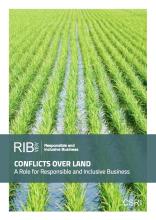Land Library
Bem-vindo à Biblioteca do Land Portal. Explore nossa vasta coleção de recursos de acesso aberto (mais de 74.000), incluindo relatórios, artigos de revistas científicas, trabalhos de pesquisa, publicações revisadas por pares, documentos jurídicos, vídeos e muito mais.
/ library resources
Showing items 1 through 9 of 183."For millions of people living in the world’s poorest countries, access to land is a matter not of wealth, but of survival, identity and belonging.
In line with the conventional view that customary land rights impede agricultural development, the traditional tenure system in Nigeria has been perceived to obstruct the achievement of efficient development and agricultural transformation.
Food First Backgrounder, Spring 2014, Vol. 20, No. 1
Introduction: Land, Race and the Agrarian Crisis
This briefing paper makes the case for proactive business engagement in respecting land rights and ensuring legal, fair and inclusive practices on land use, access to natural resources and equitable development opportunities.
The concept in this paper builds upon basic principles of sustainability to address the problem of how a sustainable project must contribute to economic and social welfare without depleting natural resources, destroying the environment or harming human health..
Notwithstanding China highlighted ecological compensation systems and policies, it hasn't issued a specialised and guiding ecological compensation law since commencement of pilot work of watershed eco-compensation policies in 2007.
Comprehensive yet concise report outlining the key challenges and projected demands in the global agricultural sector, from an energy-water-food nexus perspective.
This publication examines people, politics and the environment and their relation to drinking water supplies in rural areas. Water, Sanitation and Hygiene (WASH) has become a well-established developmental sector into which domestic water naturally falls.
This paper, which focuses on the Chinyanja Triangle (CT), an area inside the Zambezi River Basin, characterises three distinct farming subsystems across rainfall gradients, namely maize-beans-fish, sorghum-millet-livestock and the livestock-dominated subsystem.






